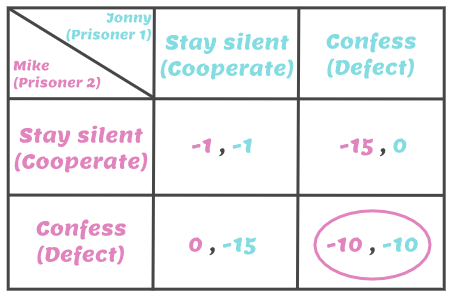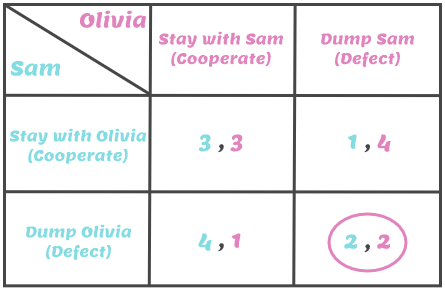The Game
Love Island is sweeping the country by storm this year. If you’re out of the loop, it’s a reality show where singles “couple up” in a villa in Mallorca where they develop relationships and try to find “love”.

When they first arrived at the villa, the girls picked their partners in the first “coupling”. At subsequent weekly recouplings, they are allowed to pick different partners. New contestants enter every week and players are evicted if they are not in a couple.
If you think about Love Island in relation to Game Theory, you can see that it is an example of the Prisoner’s Dilemma game.
Prisoner’s Dilemma Game
The Prisoner’s Dilemma is the famous paradox analysed in Game Theory which demonstrates how two individuals can end up not cooperating out of self-interest, even though cooperating would result in the ideal outcome.
In the Prisoner’s dilemma*, two criminals are arrested, let’s call them Jonny and Mike. Jonny and Mike have been caught breaking into Theo’s house. The police take them to the station and interrogate them in separate rooms so they have no way of communicating with each other. There is only evidence of their break-in, but the police believe that they intended to burn Theo’s house down. Therefore, the prosecutors do not have enough evidence to charge them with arson.

In the interrogation, if Jonny and Mike cooperate by both remaining silent about intending to torch the place, the police cannot charge them with arson. The police can only charge them with breaking and entering so they will be sentenced to just one year in prison (these are of course only examples to illustrate the game, I have no idea about criminal law!).

If Jonny and Mike don’t cooperate and they both confess their intention to burn down the house (i.e. they defect), it’s a much more serious offense so they will both be sentenced to 10 years in prison. Mutual defection = bad outcome for both.
If only one of the pair defects and the other cooperates, the defected player is rewarded for confessing and is set free whereas the one who stayed silent gets an even harsher punishment of 15 years incarceration. Basically, if Jonny snakes Mike, he can go free with 0 jail time, whereas Mike will be imprisoned for 15 years.

A payoff table makes it a lot easier to see the outcomes whilst taking each player’s strategy into consideration.
*This version of the Prisoner’s Dilemma is based on the University of Tokyo’s Coursera course.
Looking at the Payoffs

As we can see from the table, the most beneficial strategy for both prisoners is to cooperate and stay silent; Jonny and Mike would only spend one year in prison each (-1, -1). However, the most “rational” strategy for them would be to defect even though it has a longer prison sentence (-10, -10). If Mike chooses to stay silent, but Jonny decides to confess, Mike would be incarcerated for 15 years whereas Mike would go free! Therefore, to protect himself from being “mugged off”, the rational thing for Mike to do is to confess.
There is a high risk of Jonny preserving his self-interest and selling out Mike so it would make sense for Mike to confess to save himself from the maximum sentence. But, regardless of Jonny’s strategy, confessing (defection) would still be the best choice because cooperation is a dominated strategy. The payoff for cooperation is always less than for defection.
If it’s assumed that Jonny will cooperate, Mike will have a better outcome by defecting because 0 years incarceration is better than 1 year (0 > -1). If it’s assumed that Jonny will defect, Mike will still have a better outcome by defecting because 10 years incarceration is better than 15 years (-10 > -15).
Therefore, if the prisoners are purely rational, the best option would be to betray each other. This best option is called a Nash Equilibrium (circled in the table). Keep an eye out for my upcoming post explaining the Nash Equilibrium!
Love Island Dilemma
We can model the Love Island couples on the Prisoner’s Dilemma. Since the outcomes of the players’ strategies are not quantified, I will use ordinal numbers to represent the attractiveness of each payoff.
Let’s use Sam and Olivia as an example. Sam and Olivia were coupled up nicely until Chris entered the villa. Between the couple, their strategies can be simplified to:
- staying together (cooperate) or
- dumping each other (defect).

From Olivia’s point of view, these are the four possible outcomes in this situation in order of attractiveness (least attractive payoff = 1, most attractive payoff = 4):
- Lose security of being in a couple and receive backlash for being a snake
- Stay safe but be in a lacklustre relationship
- Lose security through a mutual break-up but retain good reputation
- Get to couple up with a newcomer (i.e. Chris)

As we saw in the Prisoner’s Dilemma, cooperating is a dominated strategy. Regardless of what Sam does, it’s better for Olivia to defect and vice versa. Defection yields a higher payoff in both strategies. We saw this for ourselves when Olivia indeed broke up with Sam when Chris entered the villa.
Don’t hate the player, hate the game
As the narrator constantly reminded us, “it’s called Love Island, not Friend Island”. The contestants value their friendships but they are there to win the game. Naturally, their self-interest will tempt them to betray. Also, picking the rational but slightly traitorous strategy protects players from being “pied off”.

That is not to say that they should disregard their friendships. Humans are social animals so social pressure is a strong deterrent to ruthless behaviour. In reality, people show a bias towards cooperation in these types of games. An MRI study using the Prisoner’s Dilemma showed that cooperation activates the reward centres of the brain. Cooperating makes us feel good!
Even if the player is only focused on winning the game, they still need to keep in mind the public’s perception. If they are unpopular due to their snakey actions, they risk elimination and rejection from the social group.

Furthermore, a true Prisoner’s Dilemma is only played once but Love Island continues so it’s actually an Iterated Prisoner’s Dilemma – where players learn and adapt their strategy with each cycle of the game. I will discuss this in an upcoming post!
Therefore, “being a snake” may be the best strategy “on paper” but it ultimately depends on what the player’s personal goal is. What does the player consider as winning? Finding love, making great friends, and winning the cash prize could all be considered a win; it just depends on what the player wants the most.
So what’s the point of Game Theory?
Many external factors are involved in decision making which are not represented in the Prisoner’s Dilemma. It would be practically impossible to factor in all the different facets involved. However, the Prisoner’s Dilemma is an interesting model to show what would be the best option if all players were clinically rational. By simplifying the problem, it allows us to analyse and focus on the key elements. It’s not a crystal ball but it does give compelling insight, just like a line of best fit does for data.
Love Island may be one of the sillier things to apply Game Theory to, but Game Theory has so many real world applications. By studying the strategies, we can come up with ways to encourage cooperation. Sure, this wouldn’t make for entertaining TV viewing, but we should strive to have more Camillas in a world full of snakes.



